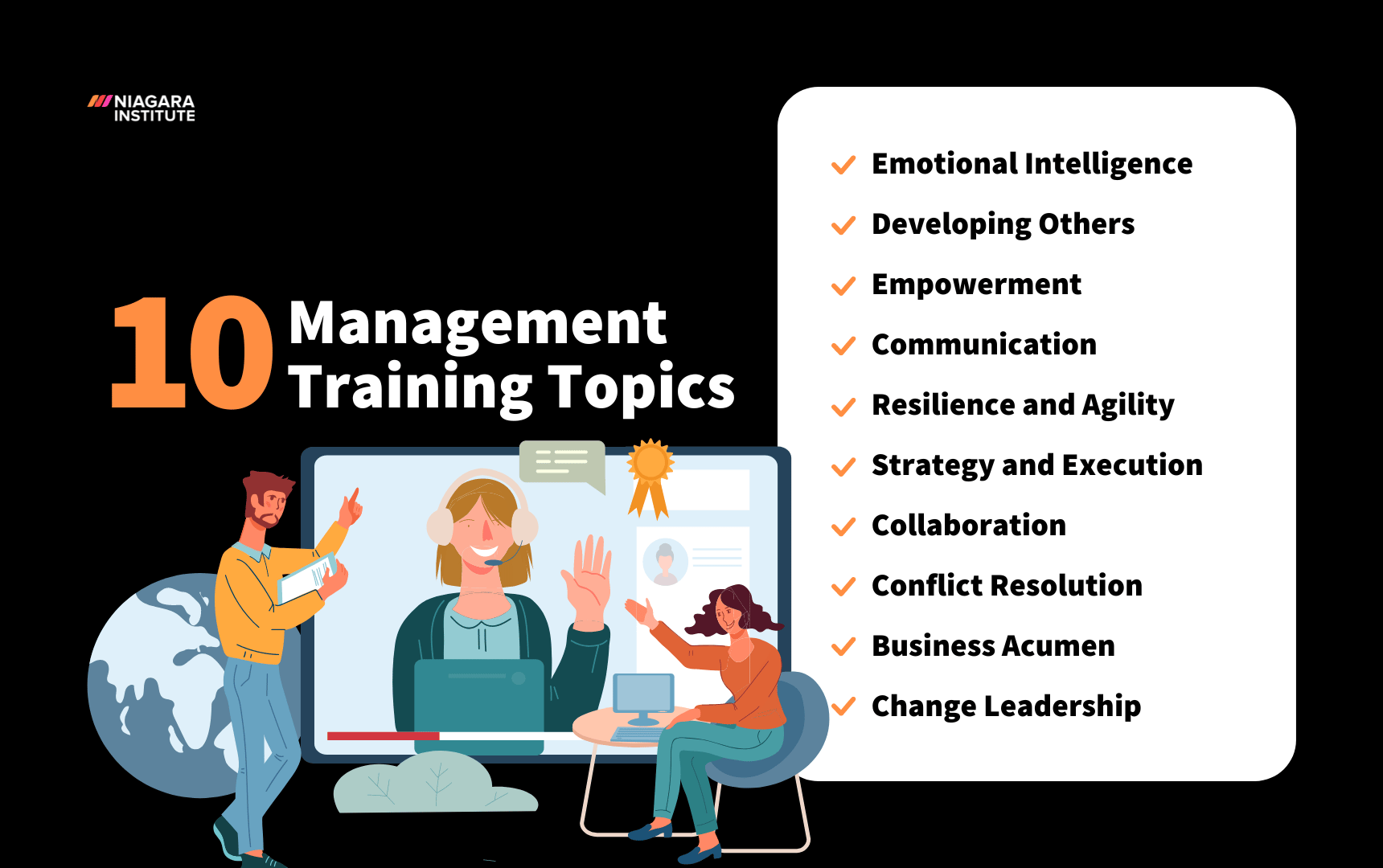19 min read
10 People Management Skills At The Workplace (20+ Statistics)
Imagine a workplace where every employee feels valued, motivated, and empowered to do their best work. This ideal scenario doesn't happen by chance;...
4 min read
 Michelle Bennett
:
Mar 14, 2023 9:52:00 AM
Michelle Bennett
:
Mar 14, 2023 9:52:00 AM

Once in a blue moon, does someone get promoted to management who is naturally gifted with the abilities, skills, and techniques needed to be a good manager. Instead, it is far more common for those promoted to management to need training, support, and experience to hit their stride.
Fortunately, this is exactly why management development training exists. But what is management training, really? Is it actually as important as they say it is? What topics should be covered in training programs for managers? If these are the types of questions you have, then you’ve come to the right place because this article contains the answers to those questions and more.
As the name suggests, management training is training for those in management and leadership roles. The goal of it is to equip leaders with the skills, knowledge, and tools they need to lead others effectively in today’s workplace. Typical topics covered in leadership training for managers include self-awareness and emotional intelligence, communication, change management, conflict resolution, and empowerment, to name a few.
Every manager has different development goals, strengths, weaknesses, and learning preferences, which makes it almost impossible to answer this question definitively. However, several factors get brought up when you hear about an excellent management training course. Those include:
Investing in training and development for those in management isn’t just a nice-to-have; it’s a must-have. In fact, according to LinkedIn, companies who invest in effective management development training are 8.8x more likely to have high-quality leadership, 9x more likely to outperform competitors financially, and 7.4x more likely to have highly-engaged leaders that stay with the company. In another study, it was also found to improve managers learning capacity by 25% and their performance by 20%
For management training to be truly effective, the topics included in the program need to provide leaders with the information, tools, techniques, and confidence they need to lead others daily. That is why you will typically see the following topics included in management training:

According to Harvard Business School, 90% of what sets high performers apart from peers with similar technical skills and knowledge is emotional intelligence. Emotional intelligence in management is the ability to recognize and manage one’s own emotions and the emotions of others. To do this, one needs self-awareness, self-management, social awareness, and relationship management skills.
Developing others refers to a manager's ability to share knowledge, pass on their strengths, assess others, provide coaching and constructive feedback, and recognize others. It’s an essential skill for those in management as it helps employees improve and advance their skills, knowledge, and performance, which has been found to increase employee satisfaction, engagement, and retention.
There are many benefits when employees are empowered. From increased engagement to greater motivation and trust in management, learning the skills to empower employees and give them autonomy over their work should rise to the top of every management development training list. However, empowerment will not be successful without knowing how to set boundaries and hold people accountable, which can be acquired through training.
If there’s one topic that’s a cornerstone of nearly all management development training, it’s communication, and for a good reason! Leadership communication training gives managers the necessary skills and confidence to speak like a leader in all situations, whether it’s an impromptu hallway conversation, formal presentation, or a Zoom call with their team.
We have been and will continue to live and lead in a volatile, uncertain, complex, and ambiguous (VUCA) world. For managers and their teams to succeed in such an environment, they need resilience and agility to bounce back from setbacks, pivot quickly, rally employees, identify creative solutions, and make sound decisions quickly.
To excel in management, individuals must gain the ability to think strategically, plan cross-functionally, and oversee the execution. To do so successfully, they will require the skills and tools to develop and sell the strategy to others, create alignment, implement a tactical plan, and relay progress and feedback across departments.
Managers always have and always will need the skills and tools to break down silos, create psychological safety, encourage information/resource sharing, set clearly defined roles, and open the lines of communication. In addition, today’s managers need to know how to promote collaboration among employees both in-person and digitally, given the rise of remote and hybrid work arrangements.
Those in management are not just responsible for navigating conflicts that they are personally involved in; they are responsible for monitoring their team and addressing disputes that arise so that they do not put the dynamics and culture of the team at risk. Fortunately, conflict resolution training can give managers a better sense of their own conflict style, help them build their confidence, and equip them with actionable techniques.
Business acumen is the combined knowledge of strategy, financial acumen, operations, strategic HR, and marketing. Understanding these areas allows those in management, regardless of their department, to see the big picture and better comprehend the organization's interconnectivity so that they can make sound strategic decisions.
Change will always be problematic in the workplace. It can be far less so, though, if those in leadership receive management training that teaches them about the nuances of change leadership. This includes teaching them how to cast a vision and unite employees around it, create buy-in for change, define expectations, answer complex questions, and celebrate milestones with employees.

19 min read
Imagine a workplace where every employee feels valued, motivated, and empowered to do their best work. This ideal scenario doesn't happen by chance;...

5 min read
Up until 2020, the level of executive support and allocated budget for professional learning and development had been on the rise. But then COVID-19...

6 min read
It’s undeniable the importance and impact first-line managers have. For good or bad, these managers significantly influence employee motivation,...